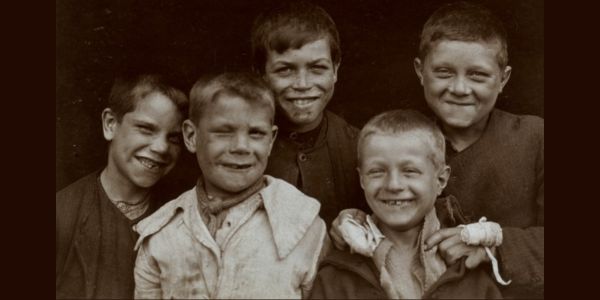Research project
Agents of Future Promise: The ideological use of children in culture and politics (Britain and France, c. 1880-c. 1950)
- Start date: 1 October 2014
- End date: 30 September 2015
- Funder: Arts and Humanities Research Council
- Primary investigator: Professor Laura King
- External co-investigators: Dr Lindsey Dodd (formerly University of Huddersfield), Dr Vicky Crewe (formerly Cardiff University)
Description
What is a child?
This seems like an obvious question, but definitions of who counts as a child have changed.
Children are said to be ‘the future’ – but what does that mean, and whose purpose does it serve? Adults have long made use of children at an individual and collective level to promote their own notions of the future. Children bear the burden of social expectations: they are 'agents of future promise'.
While this research project sought to examine children and ideology in the Western past, it also began to think about how children are still being ideologically used in the contemporary world. Through our collaboration with external partners, we examined how past insights can influence present practice.
The project was underpinned by three research questions:
1. How have children been ideologically used for political and cultural purposes?
2. Why have they been used like this?
3. How can we better understand the consequences of this instrumentalisation?
In both France and Britain over the last two hundred years, we found that a focus on children within political rhetoric was often not about prioritising their welfare, but instead served the needs of the adults around them. Using Britain and France in cross-national comparison reveals the sharp differences in the relationship between children, family and state in a monarchy and a republic, at key moments of nation-building, domestic and international conflict, and reconstruction.
Impact and Engagement
As part of the project we brought together charities which worked with and for children, including War Child, Plan UK, and Let Toys Be Toys.
At a workshop entitled ‘Children’s Burden or Benefit’ in September 2015, we compared the ways in which adults act in children’s interests, and the ways in which children’s needs can get subsumed under different political agendas. This video gives an introduction to the workshop.
You can watch all the videos from the conference on the History & Policy Youtube page.
Read more about the workshop on the History & Policy website.
Publications and Outputs
Laura King, 'Future Citizens: Cultural and Political Conceptions of Children in Britain, 1930s-1950s', Twentieth Century British History 27:3 (2016), pp. 389–411. Read the article open access on the journal’s website.
Laura King, Vicky Crewe, and Lindsey Dodd, ‘Children and Notions of ‘The Future’’, History & Policy (05 February 2025)


